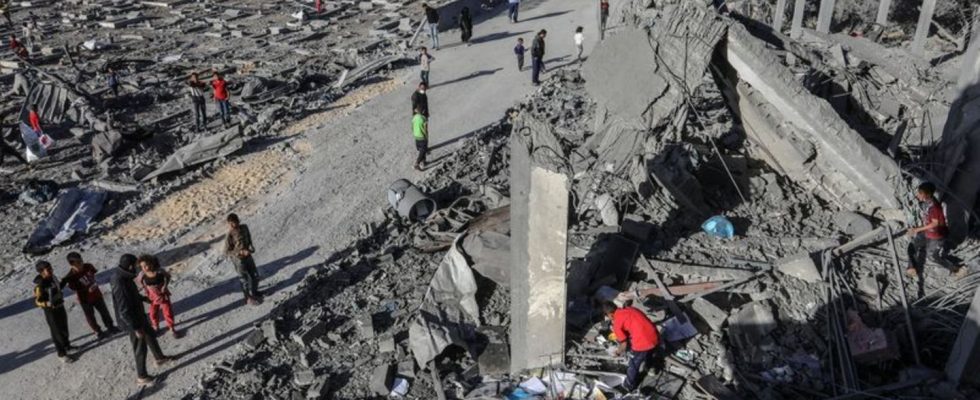Israel has been announcing an offensive in Rafah for weeks. According to a report, preparation is now underway. Meanwhile, the country is criticizing the report on the aid agency in Gaza. The news at a glance.
Despite international warnings, Israel’s announced ground offensive in Rafah in the south of the Gaza Strip is getting closer, according to a media report. Israel is preparing to move civilians from Rafah to the previously hotly contested city of Khan Yunis and other areas, the Wall Street Journal reported, citing Egyptian officials briefed on the Israeli plans.
Israel wants to destroy the last battalions of the Islamist Hamas in Rafah. Meanwhile, Israel reacted with sharp criticism to an investigation report presented in New York on the Palestinian relief organization UNRWA. The “enormous extent of the infiltration” of the aid organization by Hamas was not taken into account, it said. At the beginning of the Jewish Passover holiday, there were renewed protests in Israel by relatives of the hostages held in Gaza against Prime Minister Benjamin Netanyahu.
Report: Israel plans to evacuate Rafah residents
Israel’s allies such as the USA have urgently warned against a ground offensive in Rafah because hundreds of thousands of Palestinian internally displaced people are currently crowding there. The city near the Egyptian border is considered the only one in the sealed-off coastal strip that is still comparatively intact. In nearby Khan Yunis, among other places, tents, food distribution centers and field hospitals are to be set up for residents, the Wall Street Journal reported.
The evacuation operation would last two to three weeks and would be carried out in coordination with the US, Egypt and other Arab countries such as the United Arab Emirates. Since the withdrawal of Israeli troops from Khan Yunis, 283 dead have been found in a mass grave near Nasser Hospital, the Hamas-controlled civil defense said.
Again protests against Israel’s head of government
Israel plans to gradually move troops to Rafah, the US newspaper reported. The fighting is expected to last at least six weeks, it was said. Israel’s Prime Minister Netanyahu had previously announced “further painful blows” against Hamas. “And this will happen shortly.” Meanwhile, hundreds of demonstrators gathered outside Netanyahu’s private home in Caesarea at the start of Passover, calling on him to reach an agreement to release the hostages.
“How is it possible that the Netanyahu family celebrates in a fancy villa while Israelis are held captive in tunnels, starving, raped, beaten and murdered,” it said. The Passover festival commemorates the Israelites’ exodus from Egypt and their liberation from slavery.
US State Department spokesman: Hamas has moved the “goal post.”
Israel and Hamas have been indirectly negotiating for months over a ceasefire and the release of more hostages who were kidnapped in Gaza in the Hamas massacre on October 7th. Until a few weeks ago, Israel assumed that almost 100 of the approximately 130 remaining hostages were still alive. It is now feared that significantly more of them could already be dead.
During the negotiations, Hamas had recently hardened its positions, Netanyahu explained. Israel made significant moves in the negotiations, but Hamas then “moved the goalposts,” said US State Department spokesman Matthew Miller. The terrorist organization is currently signaling “that it does not want an agreement.” It’s up to Hamas.
Israel: Report on UNRWA ignores gravity of problem
Meanwhile, Israel clearly criticized the investigation report on the Palestinian relief organization UNRWA. Hamas has infiltrated the aid agency so deeply “that it is no longer possible to determine where UNRWA ends and where Hamas begins,” wrote the Israeli Foreign Ministry on the X platform (formerly Twitter).
In the report presented in New York, independent experts concluded that UNRWA had established a number of “robust” mechanisms to ensure that the principle of neutrality was maintained. However, there is room for improvement. At the same time, the report said Israel never provided evidence for some of its claims.
UNRWA hit the headlines in January after Israel claimed that 12 employees were involved in the October 7 Hamas massacre and that the organization as a whole was being infiltrated by Hamas. In response, UNRWA fired several workers. Some major donors, including Germany, temporarily suspended payments.
The report by former French Foreign Minister Catherine Colonna, who was in charge of the review, “ignores the gravity of the problem,” the Israeli Foreign Ministry wrote, calling on donor countries to fund other organizations in Gaza. “UNRWA cannot be part of the solution in Gaza, now or in the future.”
Examiner calls for support from UNRWA
Meanwhile, Colonna campaigned for support for UNRWA. “The international community must support UNRWA in overcoming its challenges to achieve neutrality. It is a shared responsibility,” Colonna told dpa after presenting her expert report. She did not directly respond to a question about the federal government’s pending decision on resuming payments.
It is now up to each country to study the report and decide on the next steps. “What I have seen is that the vast majority of donor states recognize the indispensable and irreplaceable role of UNRWA, are committed to finding solutions and supporting improvements where necessary,” Colonna said.
Hezbollah: rockets fired at border area in Israel
Meanwhile, tensions continue on Israel’s border with Lebanon. The Hezbollah militia said it fired dozens of rockets into northern Israel. In a statement, the pro-Iranian militia described the attack on military targets as retaliation for Israeli air strikes. On Sunday, an Israeli drone was hit by a surface-to-air missile and crashed onto Lebanese soil.
Israel’s military said fighter jets had attacked the launch base. It was initially unclear whether Sunday’s fighting was related to the rocket attack. Since the beginning of the Gaza war, Hezbollah has been firing rockets, artillery and anti-tank shells into northern Israel. So far, around 280 Shiite militia fighters have been killed in the fighting in the border area. There have also been several deaths on the Israeli side since then.

